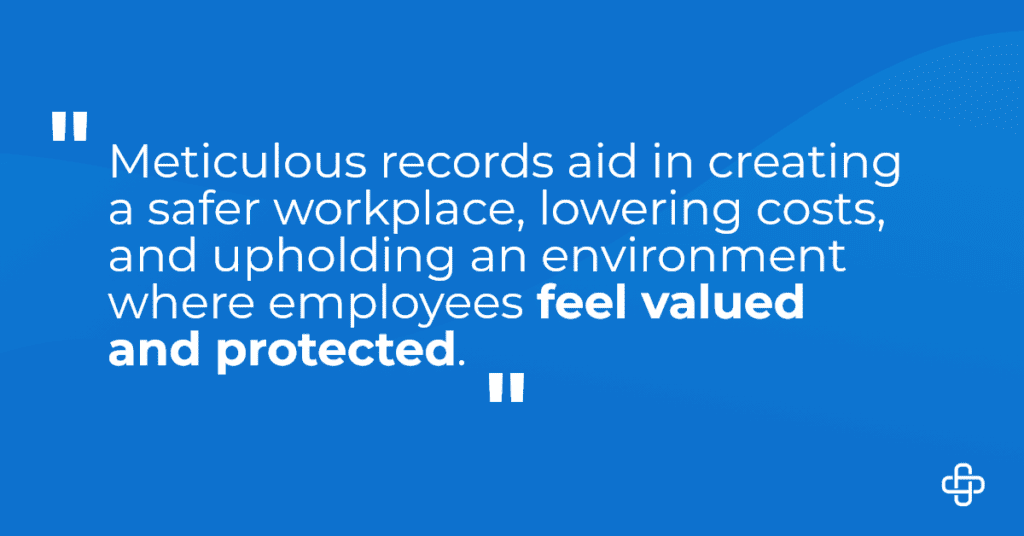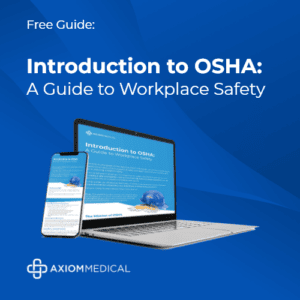Have you ever found yourself pondering the complexities of OSHA recordkeeping requirements, especially as they apply to small businesses?
Navigating the labyrinth of workplace safety regulations set forth by the Occupational Safety and Health Administration (OSHA) can be daunting, especially for small businesses aiming to maintain compliance while fostering a safe and secure work environment.

Understanding OSHA recordkeeping is paramount; these meticulous logs are not just for legal and bureaucratic box-ticking. They are lifelines that can inform future safety protocols and, ultimately, maintain the well-being of your workforce.
OSHA in a Nutshell
Tackling OSHA recordkeeping begins with a solid grasp of what OSHA is all about. The Occupational Safety and Health Act was established in 1970 to provide a safe working environment for every employee in the United States.
OSHA’s regulations are not simply suggestions or best practices; they are legal standards employers must adhere to.
Small businesses, much like larger corporations, must focus on OSHA guidelines to recognize and eliminate potential hazards, fostering a culture of safety that extends through every layer of the organization.
The Core of Compliance: OSHA Essentials
Before we plunge into the depths of OSHA recordkeeping, reviewing the essentials that lay the groundwork for all safety efforts is crucial. OSHA’s compliance checklist for employers is extensive and includes:
- Identifying potential workplace hazards.
- Establishing and communicating safety policies.
- Training employees to recognize and respond to hazards.
- Providing personal protective equipment.
- Maintaining thorough injury and illness recordkeeping.
These elements are not islands but interconnected and interdependent, working in tandem to support a comprehensive safety program.
Understanding OSHA Recordkeeping
OSHA’s Recordkeeping Rule mandates that certain covered employers maintain OSHA injury and illness incident records. Often referred to as the OSHA Log 300, these records serve as a historical timeline that could help spot worrying trends before they escalate.
The OSHA 300 Log is more than just a paperwork requirement. It’s a tool for identifying potential problems and improving workplace safety. If an employee gets injured or sick on the job, employers are often required to include detailed information about the incident in their OSHA Log.
This data provides a snapshot of your company’s safety performance and can help in:
- Identifying hazardous areas in the workplace.
- Determining training needs.
- Understanding the effectiveness of safety procedures.
- Projecting future insurance and compensation costs.
Axiom Medical and OSHA Compliance
Employing Axiom as your partner in OSHA recordkeeping ensures a robust and unbiased approach. 
Axiom’s Nurse Case Managers are OSHA-trained and educated on the standards and safety regulations established by the OSHA, helping employers prevent/minimize lost time, loss of productivity, and better OSHA recordable outcomes by providing immediate intervention with appropriate care.
Incorporating Axiom into your safety strategy, especially in deciphering and applying the fundamental principles outlined in our “Introduction to OSHA: A Guide to Workplace Safety,” extends beyond standard compliance assistance.
Our approach is designed to not only uphold the requirements set forth by OSHA but to seamlessly integrate these practices into the daily operations of your workplace, ensuring a culture of safety and well-being.
The Classification Conundrum
Cases that require medical treatment beyond first aid may need to be recorded. Axiom’s reports categorize treatments into various OSHA classifications, including:
- First-Aid Treatments, which do not require documentation
- Medical Treatment Beyond First Aid – Usually Recordable
- Restricted Work
- Lost Time
- Fatality
- Non-Medical
Recognizing these distinctions ensures that your records are precise and your workplace provisions meet the necessary standards.
Proactive Measures for Ongoing Compliance
Maintaining compliance with OSHA recordkeeping is not a set-it-and-forget-it task. It demands a proactive and ongoing approach. Here are some strategies to ensure continual compliance:
- Internal Audits and Reviews– Regular internal audits and reviews are essential to detect and rectify any potential non-compliance issues, incorrect classifications, or inaccuracies in your OSHA recordkeeping.
- Employee Engagement and Reporting– Employees are the eyes and ears on the ground. Encouraging a culture where employees feel comfortable reporting injuries or potential hazards is vital. Confidential hotlines, open-door policies, and even incentivized programs can foster engagement.
- Professional Consultation– When in doubt, seek professional counsel. Safety experts can provide insight into complex cases and ensure your business is on the right path regarding recordkeeping.
- Stay Abreast of Regulatory Updates– OSHA standards may evolve. Regularly monitoring any regulations or recordkeeping guideline updates guarantees you’re not caught off guard.
- Regular Training and Awareness– Conduct regular training sessions to ensure your team is fully aware of OSHA guidelines and the significance of accurate recordkeeping.
Committing to these strategies will satisfy OSHA’s administrative requirements and reflect a dedication to safety that resonates throughout your organization.
The Bottom Line: Benefits of Meticulous Recordkeeping
While the administrative burden of OSHA recordkeeping may seem onerous, the benefits outweigh the effort.
Meticulous records aid in creating a safer workplace, lowering costs, and upholding an environment where employees feel valued and protected.
The Axiom Advantage: Your Safety Ally
Axiom Medical doesn’t just provide solutions; it offers a partnership in safety. With Axiom by your side, OSHA recordkeeping shifts from a chore to a strategic tool.
OSHA recordkeeping is a collaborative endeavor for small businesses. It’s a collective responsibility that involves the workforce, dedicated safety professionals, and trusted partners.
By demystifying OSHA recordkeeping and integrating these principles into the fabric of your organization, you’re not just ticking a regulatory box; you’re building a fortress of safety that stands resilient in the face of workplace challenges.
Want to find out more? Join Axiom Medical’s experts, including Chief Medical Officer Dr. Scott Cherry, for a free replay of our webinar: Advanced OSHA Reporting and Recordkeeping Workshop.
This workshop provides pivotal information for those committed to enhancing workplace safety protocols.
Charli Pedersen is a published writer featured on Axiom Medical’s blog. She holds a bachelor’s degree in English, Professional and Technical Writing, and has experience creating content for businesses and non-profit organizations.










